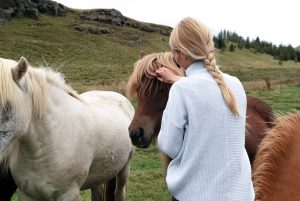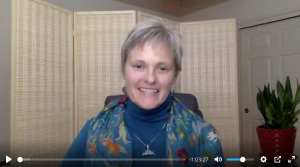 One of my jobs as an interspecies communication teacher is to help people to see how their ideas, preconceptions, and cultural conditioning may impede their ability to communicate freely and openly with beings of all species.
One of my jobs as an interspecies communication teacher is to help people to see how their ideas, preconceptions, and cultural conditioning may impede their ability to communicate freely and openly with beings of all species.
These patterns, habits, and ideas keep us separate from other species, and inhibit our ability to communicate with other-than-human beings in a clear, connected, authentic way.
In this post, I want to address the idea of human superiority: how it can interfere with our relationships and ability to communicate with animals and all life, and one of the specific ways that it can manifest: in the language that we use to describe our animal family and companions.
The Myth of Human Superiority
Notions of human superiority run deep, in our culture(s), spiritual and religious traditions, and in our educational systems.
There is a long history of the human species assuming our superiority to the beings of other species on our planet: physically, mentally, emotionally, and spiritually.
These misconceptions and misunderstandings even permeate many spiritual and metaphysical worldviews, in addition to traditional religious teachings. I’ve heard many so-called spiritual and metaphysical teachers express these kinds of views:
- humans are most highly evolved; animals are less evolved
- human incarnation is the pinnacle of spiritual evolution; our souls progress through various species until we “arrive” in a human incarnation
- humans have big and highly developed brains and so therefore they are more evolved and advanced than other species; brain size and development is related to awareness and intelligence; e.g. big brain = more, small brain = less
- animals inhabit the second dimension and so are less aware of other dimensions
- animals are here to teach us unconditional love which we then can transfer to humans (lower consciousness to higher consciousness)
- animal relationships are a “training ground” for human relationships
- animal relationships are pure and unconditional because animals are less complicated and advanced than humans
- people have deep relationships with animals because they are somehow impaired in their relationships with humans
- domestic animals are stunted and blunted spiritually because of their relationships with humans who live with them as companions
And on and on it goes. These are all human ideas and constructs that prevent us from experiencing the multi-layered, multi-dimensional possibilities of true, deep connection with other-than-human beings.
Humans do not necessarily have the highest, most developed consciousness on the planet. Other-than-human animals are not “lesser-than”, less-evolved, less-developed in comparison with humans. They are full, complete beings in their own right, with their own purposes, soul development, wisdom, and awareness.
In fact, on many levels, humans are undeveloped compared to other animals. Scientific studies have repeatedly illuminated the senses, gifts, and skills that other-than-human animals, plants, and trees have that we humans cannot even begin to fathom.
Over and over again, in my personal life and relationships with animals, in my teaching, and in my private work with clients, I communicate with animals who are far more aware, far more spiritually “advanced,” and who are far more in touch with universal love and the principles of oneness, connection, and unity. Animals of various species have often communicated that they view humans as somewhat underdeveloped, because of our lost capacity for recognizing these qualities of awareness, communication, connection, and understanding that beings of other species share.
Animals are not just here for us. Whether for mirroring, spiritual advancement, training in love…animals are not our servants or our tools. They are full, complete beings in their own right, with their own experiences, understanding, awareness, and spiritual journeys. Sometimes, these journeys intersect and interrelate with ours in deep and powerful ways.
Sometimes, it’s really not about us at all.
Why I don’t like the terms “pets” and “fur babies”
The language that we use as humans is both imprecise, and powerful.
Although I understand that the intention of using words like “pets” and “fur babies” is often to recognize animals as more than tools, objects, or beings who are solely alive for use of humans, I feel that the using these terms diminishes animals and the depth of our potential relationships with them.
We can do better.
These words, while perhaps endearing, and a step beyond considering animals property or tools, still, in my opinion, reduce animals to a smaller, “lesser-than” status in comparison to humans. These terms don’t convey the full awareness of multi-dimensional consciousness that animals embody, and don’t include a sense of partnership, equality, or mutuality. These words still contain an energy of animals in service to humans.
There is a common understanding that “pets” are animals who are companions, but inherent in the definition of this term is its legal definition:
“The term “pet” means a domesticated animal, such as a dog, cat, bird, rodent, fish, turtle, or other animal that is kept for pleasure rather than for commercial purposes.” (Source: Cornell Law School)
I dislike the term “fur baby” even more than I dislike the word “pet.” Our animal companions are not babies (unless they are, in fact, very young animals), and they most certainly are not our human babies or children. Though I can understand that using this term may have the intention of recognizing animals as important members of our families, again, I feel that it diminishes animals, making them into two-dimensional, infantilized beings.
While it’s true that our companion animals are generally dependent on us for their care and well-being, it is really important to recognize animals as full, complete, sentient beings in their own right, not just in relationship to us as humans, the gifts they share with us, or their place in our lives and homes.
For many years, I had a framed print of this quote by author Henry Beston, from The Outermost House, hanging in my kitchen. Though it’s old, written in 1928, and uses the language of the time to refer to humanity (“man”), I think that it is relevant to this discussion of language and how we view our animal companions:
We need another and a wiser and perhaps a more mystical concept of animals. Remote from universal nature, and living by complicated artifice, man in civilization surveys the creature through the glass of his knowledge and sees thereby a feather magnified and the whole image in distortion. We patronize them for their incompleteness, for their tragic fate of having taken form so far below ourselves. And therein we err, and greatly err.
For the animal shall not be measured by man. In a world older and more complete than ours they move finished and complete, gifted with extensions of the senses we have lost or never attained, living by voices we shall never hear. They are not brethren, they are not underlings; they are other nations, caught with ourselves in the net of life and time, fellow prisoners of the splendour and travail of the earth.
The more that we can shift this attitude of human superiority, and begin to relate to animals and all life as full, complete beings, in many ways perhaps even more evolved and advanced than we are, the more we will create the mindset and energy that can begin to heal the fractured relationship between our species and the other beings who share our world.
Treating animals as equals, different in body and experience, but similar in capacity for awareness and understanding, is one of the most important first steps in relating to them in such a way that authentic communication and deep relationship is possible.
We can start at home, in our own families. We can use the words “animal friends”, “animal companions”, “animal family.” We are not their “owners”, and they are not our possessions or our babies, no matter what the laws say.
As we relate to animals in this way, we honor them, the fullness of their being, their sentience, awareness, and who they are as complete spiritual beings with their own perspectives, life-purpose, and spiritual journeys. Then, our relationships with them can grow into deep, intimate, sharing of spiritual growth, life experiences, and mutual understanding.
In this way of relating, authentic communication and understanding unfolds naturally, in the absence of the blocks and barriers that our human constructs have created. We can understand our animal friends, and they can understand us. We are partners, sharing life experiences, relationships, and understanding.
This simple, but not easy, attitude of humility, and a willingness to learn, to expand, to be taught, and to grow, has the potential to change everything: in our relationships with our animal companions, in our communities and connections with the wild ones, and in the capacity of our species as a whole to understand the impacts of our behaviors and lack of consciousness and awareness on the other species who share our world.
We can do better. It’s long past time. The other animals are there, waiting for us to wake up, waiting for us to reconnect, waiting for us to remember our relationship as part of, not separate from, all life.


